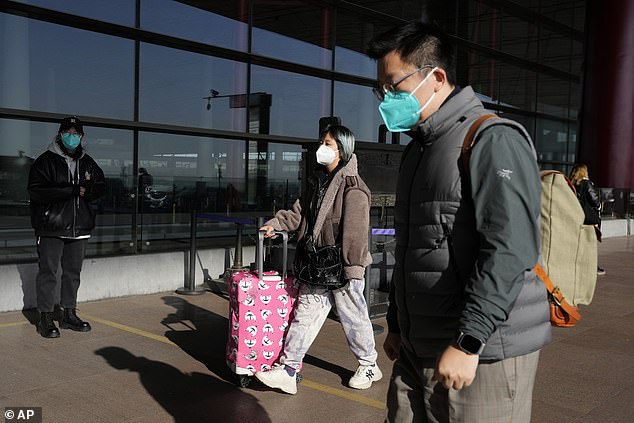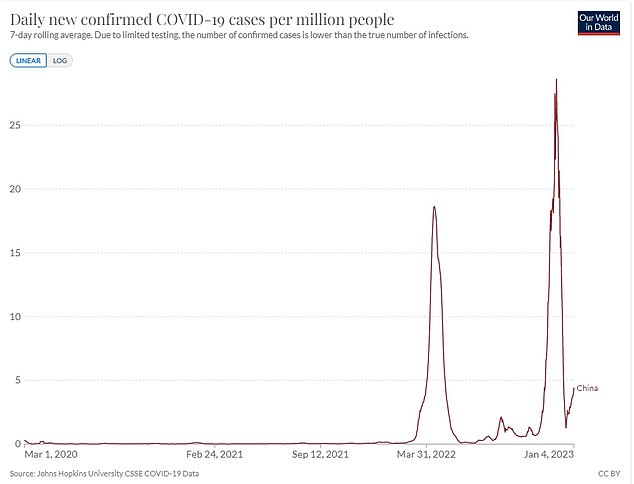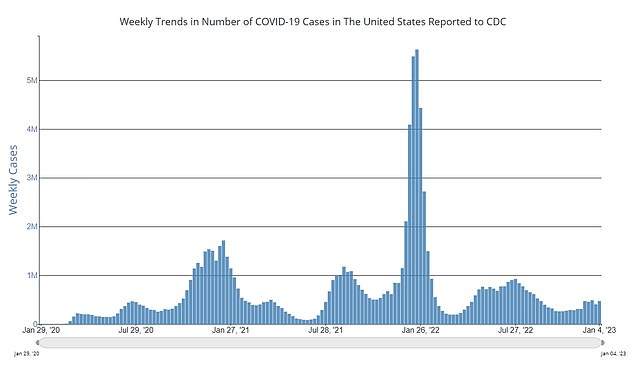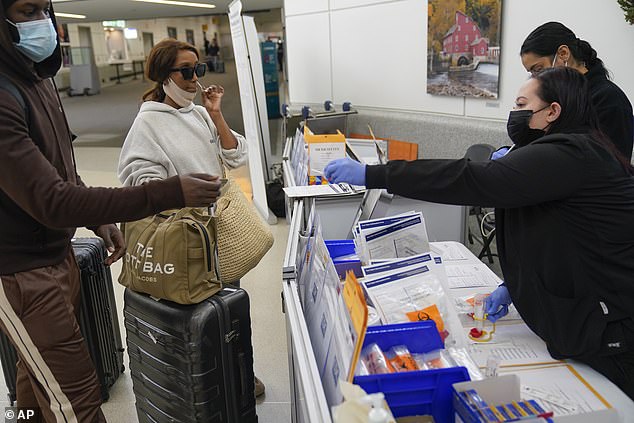CDC starts testing SEWAGE from airplanes amid fears China’s outbreak will spawn a new Covid variant
>
US health officials have started testing sewage water from airline flights in an attempt to track the spread of new Covid variants.
The Centers for Disease Control and Prevention (CDC) is trialing the method amid rising concerns China’s catastrophic Covid outbreak could create a dangerous new strain of the virus.
Lori Tremmel Freeman, chief executive officer for the National Association of County and City health officials, said wastewater on at least one US-bound flight had been screened in the past week.
She said the CDC was also mulling expanding the program to multiple flights or an entire airport.

Masked passengers arrive at the Capital airport terminal in Beijing. Travellers from China are now required to test before entry to the United States


The graph above reveals a recent spike in daily confirmed Covid cases in China. The WHO this week accused the Chinese government of vastly under-recording the severity of their current outbreak, as the country reportedly suffered 250 million cases in December alone after suddenly ending its draconian zero-Covid policy. Only a fraction of these cases were recorded


The above graph shows weekly cases in US. Despite the rise of new variant XBB.1.5, cases have remained relatively stable since the spike of winter 2022.
Freeman did not know which flight had undergone this initial testing, nor where it was located, but said sewage testing is a ‘promising area of surveillance for the future’.
‘Expanding the wastewater surveillance just is another data point that can be helpful,’ Freeman explained, ‘and it’s a less-intrusive way of doing disease surveillance.’
Passengers from China are already required to screen for Covid before entering the US, with other countries also re-establishing such preventative testing measures.
But health experts have questioned whether either method actually prevents Covid from spreading.
Dr Michael Osterholm, an infectious disease expert at the University of Minnesota, said earlier this week: ‘They seem to be essential from a political standpoint. I think each government feels like they will be accused of not doing enough to protect their citizens if they don’t do these.’


The US now has expanded its genomic sequencing program to 7 airports across the country, with disembarking passengers volunteering to take anonymous Covid tests for study purposes
There is some evidence that testing sewage water from airlines is more effective for spotting the virus than pre-departure testing.
For example, French researchers testing plane wastewater in December 2021 found the Omicron variant in the sewage of two commercial flights from Ethiopia to France, despite passengers testing for Covid two days before boarding.
Researchers sampling community wastewater in San Diego, California, similarly detected traces of the Alpha, Delta, Epsilon and Omicron variants up to 14 days before they showed up on nasal swabs.
Crucially, neither intervention had any measurable effect at reducing infections.
The new wastewater testing method is another attempt to get ahead of potential new variants emerging from China’s massive outbreak, as the government remains famously tight-lipped about its Covid data.
The World Health Organization recently accused China of ‘under-representing’ the severity of this recent spike in cases after Beijing abruptly ditched its ‘zero-Covid’ policy, unleashing the virus into an undervaccinated and previously unexposed population.
The country reportedly suffered 250 million cases in December alone, yet only a fraction were officially reported.
‘We continue to ask for more rapid, regular, reliable data on hospitalizations and deaths, as well as more comprehensive, real-time viral sequencing,’ announced WHO director-general Tedros Adhanom Ghebreyesus at a media briefing in Geneva.
Part of the problem is China’s extremely narrow definition of what constitutes a Covid death.
Only those Covid patients who have died of respiratory failure are deemed to fit the criteria.
In the two weeks prior to January 5, China has therefore reported fewer than 20 deaths from local Covid cases, despite chilling footage showing people forced to burn bodies in the street as hospitals and crematoriums across the country are overwhelmed.
China has previously dismissed criticism of its Covid statistics as groundless, downplaying the risk of new variants and saying it expects mutations to be more infectious but less severe.
The US also expanded its voluntary genomic sequencing program at airports this week, adding Seattle and Los Angeles to the program.
This brings the number of airports gathering information from positive tests to 7.
